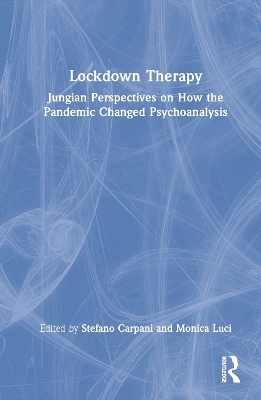
Lockdown Therapy
Routledge (Verlag)
978-1-032-21023-0 (ISBN)
This fascinating volume explores — from the perspective both of analysts and their patients—how the COVID-19 pandemic quickly and unexpectedly created profound and lasting changes in the ways psychoanalysis is conducted, and what those changes mean for analysis moving forward.
The first part of the book is made up of interviews conducted by Stefano Carpani with authoritative authors in analytical psychology during the earliest phase of lockdown, centered on themes of the pandemic, lockdown, and how each individual was coping with the challenges those circumstances brought on. The second part features personal essays that further details the subjective experiences of Jungian analysts and therapists worldwide, comprising a collection of reflections on how COVID-19 affected and changed the way analysts work with patients. These reflections focus on the theoretical, clinical, technical, and also practical points of view, including clinical materials on transference and counter-transference considerations. The third part of the book is specular to the second and offers reflections from patients’ perspective on how the pandemic changed their therapies and lockdown affected their experience of therapy. Patients have provided anonymous testimonies through their writing of how they experienced of the change of setting, mindset and related implications.
A comprehensive overview of an important and ongoing conversation, Lockdown Therapy is crucial reading for Jungian analysts and scholars, as well as other clinicians training in analysis, psychotherapy and counselling.
Stefano Carpani, M.Phil., M.A., is a psychoanalyst (CGJIZ and IAAP). He is the editor of Breakfast at Küsnacht (Chiron, 2020), The Plural Turn in Jungian and Post-Jungian Studies (Routledge, 2021), Anthology of Contemporary Classics in Analytical Psychology: The New Ancestors (Routledge, 2022) and Individuation and Liberty in a Globalized World: Psychosocial Perspectives on Freedom after Freedom (Routledge, 2022). Monica Luci, PhD, Jungian and relational psychoanalyst (AIPA-IAAP and IARPP), works in private practice in Rome. She is the author, translator, and editor of publications on the themes of trauma, displacement, collective violence, sexuality, and gender, among which the monographs Torture, Psychoanalysis & Human Rights (Routledge, 2017), and Torture Survivors in Analytic Therapy: Jung, Politics and Culture (Routledge, 2022).
Preface Introduction: The Suspension of Certainties Part I 1. Spring and Imagination 2. Nature and Death 3. Illness as Metaphor 4. Compensation 5. The Suspension of Time 6. Psychosocial Perspectives and Covid 19 7. The Suspension of Certainties 8. Fraternitè 9. Nightmares Part II 10. How I Was Affected by Covid-19 in my Practice 11. Are You There? Disconnection Entering the Analytical Space 12. One Other Contagion in the Time of Coronavirus 13. Covid-19: Impressions, Sidelights, and Thoughts from the Psychotherapeutic Practice 14. Poetry as a Personalized Lockdown Therapy 15. Presence and Absence of the Body in Psychotherapy During Lockdown 16. What Does the Virus Do to the Analytic Container? Thoughts on the Frame in Times of Pandemic 17. Lockdown Therapy: What the Virus Gives and Takes Away 18. How Are You? The Mystery of Communication Between Alone-nesses 19. Psyche and the Speed of Life: Jungian Reflections on the Pandemic 20. To Touch and To Be Touched: On Affection, Infection and Contagion: An Analysis of the Analytic Ethic Reimagined Through Coronavirus 21. Jungian Analysts' Experiences of Working Online 22. Saying "Goodbye" Over Zoom: On Termination During Covid 23. Impact of the Pandemic on my Therapeutic Practice 24. Living in the Shadow of War 25. Home, Sweet Home 26. The Expanded Container: Analysis in a Pandemic 27. Facing Suffering, Compassion and Tranformation 28. Online Therapy: The New Normal? 29. Is the Genie Out of the Bottle? The Impact of the Pandemic on Analytic Process and Analytic Training 30. Accelerations and decelerations: Individuation at Pandemic Speed Part III 31. 'Me and My Therapist are Bodies in Space, Or: Embodied Sliding on the Ego-Self Axis 32. Coming and Going 33. A Personal Experience of Therapy During Covid-19 Pandemic
| Erscheinungsdatum | 13.10.2022 |
|---|---|
| Zusatzinfo | 1 Halftones, black and white; 1 Illustrations, black and white |
| Verlagsort | London |
| Sprache | englisch |
| Maße | 156 x 234 mm |
| Gewicht | 620 g |
| Themenwelt | Geisteswissenschaften ► Psychologie ► Allgemeine Psychologie |
| Geisteswissenschaften ► Psychologie ► Psychoanalyse / Tiefenpsychologie | |
| Geisteswissenschaften ► Psychologie ► Sozialpsychologie | |
| Medizin / Pharmazie ► Medizinische Fachgebiete ► Psychiatrie / Psychotherapie | |
| ISBN-10 | 1-032-21023-0 / 1032210230 |
| ISBN-13 | 978-1-032-21023-0 / 9781032210230 |
| Zustand | Neuware |
| Informationen gemäß Produktsicherheitsverordnung (GPSR) | |
| Haben Sie eine Frage zum Produkt? |
aus dem Bereich


